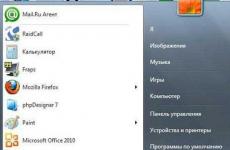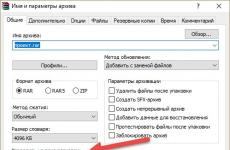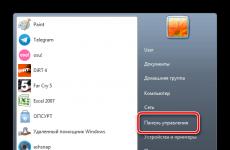A strong password made from numbers. Creating passwords: how to come up with a strong password. When drawing conclusions, you should understand that cracking a password is quite simple, so
A strong password can protect you and your data from the machinations of intruders. On the Internet, any profile requires a “password” to log in. Only you should know it - and no one else. So you will have to try hard to come up with a decent secret combination that is not so easy to recognize. In some cases, you can use one trick, but it still will not be able to completely secure your profile on the Internet. What tips should you use to make your “password” difficult to guess?
Numbers, letters, symbols
The most secure password is a combination that is difficult to remember and guess. Therefore, users always think about what they should use as a “password” for authorization on various services.
The first advice that advanced “users” give is to use a combination of numbers, letters and symbols in their secret combinations. It is also recommended not to create short passwords - it would be better if they were long and difficult to remember. This way you can protect your data.
What specific combination should I use? You'll have to figure this out on your own. However, there are a few more tips to help you create a strong password.
Register
Please note that often forms for entering "passwords" are case sensitive. In other words, they distinguish between lowercase and uppercase letters. This is a great opportunity to diversify your secret combination.

When coming up with a strong password, try to combine not only numbers with letters and special characters, but also alternate between lowercase and uppercase ones. This approach helps make it more difficult for attackers. The main thing is, don’t forget which letter is in which case.
It is recommended to capitalize the very first letter, and then alternate according to the “every other” principle. This kind of technique will help you avoid getting confused in the password you created. So take this advice into account. Which password is more secure? One that uses a variety of registers when writing. It is possible to do without this feature, but it is not advisable.
Changelings
They say you shouldn't use dates that are important to you in your passwords. But that's not true. It is enough to slightly diversify the approach to this issue. There is such a technique as “shifters”. It helps you use dates that are important to you in your “password”. At the same time, it will be very difficult to unravel your secrets.

What is this principle based on? At the very beginning of the password you choose, you should write a date. For example, your birthday. And at the end - the same date, but upside down. If 123 is written at the beginning, then 321 is written at the end. As you can see, there is nothing difficult about this. Therefore, this technique is used by many users. It’s easy to remember the general principle of constructing a “secret record”. This means you won’t forget the “password” just like that.
Now it’s worth taking a closer look at strong passwords. Examples of these using “shifters” are what will help you figure out exactly how to create a good combination for authorization in an account on the Internet.
Let's assume that the "body" of our password will be the user's first and last name. Then we print: IvAnIvAnOv. Now you should use the “shifters”. To do this, let's take some date. For example, how often is the user's birthday selected? Let in our case it be May 4, 1988. And we dilute it all with symbolism. The final combination is: 4051988!~IvAnIvAnOv~!8891504. This is the complex password we have. In fact, it is easy for the user to remember, but it is extremely difficult for attackers to guess. In any case, practice shows exactly this situation.
Generating
If you can’t come up with a strong password yourself, you’ll have to use one little trick. Just don’t think that it will completely protect you from hacking. There is nothing better than a personally invented “password”.

What kind of reception are we talking about? About using special password generators. They themselves make up “secret combinations” using symbols, letters and numbers. Of course, taking into account the registry. But “shifters” are not used here.
You can download any password generator. Just launch the application and click on the "Generate" button (or something like that). You will receive a combination as a password. It can be supplemented or used in its original form.
Requiring registration and use of a password to gain access to your account. E-mail, Internet messengers, personal account of the Internet provider, chats, forums, other sites and this is at a minimum. In this article we will try to figure out how to come up with passwords for all these countless services.
When registering on a new website, we often stop and think when we see the password entry field. An almost ideal way to create a strong password would be to generate a random password using a special program such as . But such passwords are difficult to remember, which means they need to be written down and stored somewhere. This option is not suitable for some ordinary users. Even if you use a programmatic method to create and store passwords, you will still have to remember some passwords.
When creating a password manually, you must follow several rules:
- You cannot use simple combinations of symbols and numbers. For example, passwords 123, 321, 123456, qwerty, asdfg and others are not suitable.
- Cannot be used when creating a password (names of relatives, pets, dates of birth, phone numbers, addresses, zip codes, etc.). For example, the passwords Masha, Sasha21, Vasya02071988 and others are not suitable.
- Do not use passwords that can be guessed from a dictionary of popular passwords. For example, the passwords love, cat, alfa, samsung, mercedes, yasterva and others, as well as their variants and combinations are not suitable.
- Do not use passwords that are less than 10 characters long.
- The password must consist of upper and lowercase letters, numbers and special characters.
- When coming up with passwords, use your imagination and don’t think in stereotypes. The computer that guesses your password is good at math, but it can't think or be creative.
There are many ways to come up with a simple and relatively strong password. We will look at one of these methods.
How to come up with a password
The first thing we need to do is come up with a key phrase. The ideal option would be a unique nonsense phrase that is easy to remember. For example: space cockroaches. You can also use phrases from not very popular songs and poems.
- Recording a Russian phrase in an English layout.
- Write the phrase backwards.
- Replacing letters with their visual counterparts (“a” - “@”, “i” - “!”, “o” - “()”, etc.).
- Using the first few characters of each word.
- Removing paired/unpaired characters.
- Removing vowels/consonants from a phrase.
- Adding special characters and numbers.
You can use several of these methods to turn the key phrase into an almost meaningless string of characters. But, the ideal option would be to create your own unique method of “encrypting” the key phrase.
For example, using several template methods " " you can get the following password:
space cockroaches– use the first 4 characters from each word – kosmtara – write in the English layout – rjcvnfhf – write with a capital letter and add special characters and a random number – Rjcvnfhf@955
As a result, we ended up with a long and rather complex password that cannot be calculated from the personal information of its owner, but can be easily recovered from memory. Having checked the strength of the password using the service, we get the result “very strong”.
In conclusion, I would like to remind you once again that when coming up with a password you need to use your imagination and the ability to think outside the box. Using this advantage over "dumb" computers, you can create passwords that will be too tough for them.
Nowadays, it is impossible to imagine life without a computer and constant input of various combinations. We need it almost everywhere, from starting the computer, registering on websites, logging into forums, email and social networks, for example, Odnoklassniki, and ending with pages and accounts in electronic wallets. If with optional registration somewhere you can not come up with a combination, but specify a random key combination, then when creating any permanent account, especially if it concerns any money transfers, the password must be reliable.
What password can you come up with?
Any combination can be hacked, and the data can be used by an attacker to open loans. That is why it is imperative to take care of protection in advance and exchange weak combinations for reliable ones.
Hacking passwords
Even an inexperienced hacker can crack easy combinations and combinations in a password. It’s a very simple method of selecting and trying all possible options. This is called brute force. Such as 00000, 11111, qwerty, 123456 and the like are checked immediately, and then various symbols are substituted for them. There are special programs for such a search, which takes very little time.
 Another popular hacking method is to analyze all a person’s data. All relevant information is collected and entered into the password. This applies to initials, date of birth and other information. In this way, you can also select the secret question required to recover your password. Where is data about a person collected? Most often on social networks such as Odnoklassniki, VKontakte. Here you can find out everything from your husband’s name to your dog’s name and your favorite musical group.
Another popular hacking method is to analyze all a person’s data. All relevant information is collected and entered into the password. This applies to initials, date of birth and other information. In this way, you can also select the secret question required to recover your password. Where is data about a person collected? Most often on social networks such as Odnoklassniki, VKontakte. Here you can find out everything from your husband’s name to your dog’s name and your favorite musical group.
Password storage
Have you created one strong password, two, and the third one is no longer remembered? Because of this, many users create combinations, for example: “1 password”, “2 password” and so on, for various sites. This is wrong, because if one of them is hacked, then the rest will be easy to hack. To save combinations, keep a notepad or file on your personal computer, but not in a place visible to everyone, otherwise some people manage to write passwords on a sticky note and stick it on the monitor, not at home, but in the office. Show the same attitude towards “secret questions”.

Other ways to create a strong password

How safe is it to store passwords on your computer?
It’s not safe, there are a huge number of programs that contain so-called “key loggers” or are capable of searching for valuable files on a hard drive, flash card or other media. Even if you are protected by expensive antivirus programs, it is better to play it safe and store information in paper notebooks.
My dear friends! In this post, I touch on such a serious topic as creating a strong password.
First, I'll tell you a little story.
On my advice, my friend set a complex, reliable password for his VKontakte account, 11 characters long, including letters and numbers. He lived quietly and lived. But at one point he decided that he was too lazy to type such a complex password every time and changed the password to his date of birth.
Two days passed... And at one point my friend, trying to log into his VKontakte account, sees the following message:
“This email address is not registered or the password is incorrect.” All. Curtain. As they say, “Finite la comedy.” The page was hacked. The account cannot be returned back. Bad people on his behalf send false information for profit, and also send spam. The hacking victim calls everyone to warn them that he was hacked... In general, he found enough problems for his ass. To prevent similar stories from happening to you, I wrote this post.
Which password is more secure?
Password is a delicate matter. =) There are several rules that must be followed when creating a password so that it does not get picked. How can they even guess your password? A whole discussion can be started on this topic. But I'll say it briefly. The most popular method is brute force, which means a complete search (or the “brute force” method).
As you probably guessed, the principle of its operation is based on trying all possible password combinations. In this case, you can protect yourself by simply creating a very long password. The next method is to analyze known information about a person. This is your name, year of birth, favorite quotes, etc.
A bot or a person records all known information about you and uses it in different forms when hacking. Using this method, the account of my friend, whom I told about, was hacked. Protection in this case is an absolutely meaningless set of letters, numbers and symbols. The program will substitute, for example: Vova14.02.91 or 8-999-648-28-41, and your password will be something like “tpr7lx48a%7d”. The program would never think of trying such an outrage.
Well, and also, attackers will most likely try to hack your mailbox by choosing the answer to your secret question. Imagine the picture: a bad person types in the user’s login and clicks: “forgot my password.” And he is asked to answer a question prepared in advance by the user: “The name of my parrot.” Hmm... Maybe Arkady? Or Evlampius?
In general, I think, despite my irony, you understand what you need to write in a security question. Although the number of attempts to “guess” the answer is limited, I assure you that even a very narrow-minded person can answer “Kesha” to the question “The name of my parrot.” Just in case, I’ll say it specifically. It is desirable that the answer, well, never occurred to a healthy person. For example: “What year was my mother born?” The answer is “Rhinoceros.” Not bad, right?
And if you also want to mock the burglars, then you can send them to hell with the question. Only in this case, you must be 100% sure that you will not forget the password, otherwise it will not be very pleasant when you try to recover the password to see the inscription “Go through the forest!!!”
You might think that if you come up with a strong, secure password, then you can now register with many sites using it. If this is the situation, then I will disappoint you. You are wrong. It is advisable that all services have different passwords. So, based on all of the above, I will try to specifically answer the question - what should a strong password be?
Strong password must be simultaneously:
Pointless.
Complex.
Not memorable the first time.
Long if possible.
Consist of letters and numbers, if possible, then also symbols.
With letters of different case.
Now I'll tell you how should NOT be password:
Simple letter sequence: qwerty
Simple number sequence: 12345
Any date of birth: 06/18/1984
Any first name (last name): vasyapupkin
In general, any existing word
Whatever the password is: from a mailbox, ICQ, an account on a forum, it must be complex! Well, if you absolutely do not care about the future fate of any account (for example, you are registering in order to download a game to your mobile phone), then when registering, feel free to write in the password field: “qwerty”.
It’s worth saying a few words about storing passwords. Storing passwords on your computer is a very bad idea! It is much better if you keep them written on a piece of paper, hidden in a safe place.
It is better to remember the password, i.e. learn by heart! When coming up with a strong password, do not think about its meaning, but simply poke at the keys with your eyes closed, periodically pressing Shift.
Here are a few examples of brute force password selection:
Brutus will select an eight-digit password (date of birth) in 6-10 seconds.
The password - name (Ivan or Marya) will be selected by the brute in a time from 15 minutes to 5 hours (depending on the length of the name).
It will take several million years for brute force to find the password “Jf89@nfd%4P3nj”.
Judge for yourself...
First way
The most important trick here is to come up with a keyword that will become the basis and template for all your subsequent password options. This word will always remain unchanged and will be placed at the beginning of the password. For example, such a word would be “ dog».
Now we need to create the second, variable part of the password. This part can be the first 3-5 letters of the name of the site whose services the person uses. For example, if a person uses the site KAKru.ru , then the variable part may look like this - “kak”.
By connecting the two parts, putting, for example, an underscore between them, you get the password - “ dog_kak».
Thus, all passwords will be different, but compiled according to the same, understandable scheme. Such passwords will be very easy to remember.
It is also important to know that the password must include at least eight characters and contain not only letters and numbers, but also symbols. In this case, it is an underscore.
Numbers can be added to the template (constant part). Let, for example, it be the number of your birthday or something else well known to you. The password will be " dog25_kak».
It will be extremely difficult to pick or crack such a password, but remember it without much difficulty.
Second way
You can make a simple and memorable password using an online generator. For example, use the site passwords.lance.com.ua- passwords of 5-12 characters, pronounceable and easy to remember. To receive new passwords, you just need to refresh the page.
Third way
Password from a phrase. You need to come up with a phrase. “Fluffy stone”, or “Liquid foot”. The crazier the phrase, the better it is remembered. This password can be made more complex and its constituent words can be declined. “Explosive Clown”, “Horned Cat” are already quite reliable and at the same time well remembered.
For extra security, you can add numbers before the phrase (“12 fluffy stone”) or write words in different layouts (“ :blrfzleg»).
Fourth method
Password from a phrase. You need to take a memorable phrase, for example, “What a disgusting thing your jellied fish is!”, or “I love a thunderstorm in early May.” Such phrases, associated with the password theme, are very easy to remember. Now we write the two initial letters of the phrase - “Kagavazars”, “Lugrvnama”. We write in the English layout - “ Rfufdfpfhs" The result is a complex and unpronounceable password that is easy to remember.
Fifth method
You need to randomly replace letters with numbers, for example, flirt can be turned into fl1r7.
Sixth method
You need to take the word and turn it around. For example, take the English word neighborhood and get doohrobhgien.
Rules for creating a strong password
- Every three months, or at least every six months, you need to change the passwords on all your accounts!
- You cannot use simple combinations of symbols and numbers. For example, passwords 123, 321, 123456, qwerty, asdfg and others like that are not suitable.
- You cannot use personal information when creating a password (names of relatives, pets, dates of birth, phone numbers, addresses, zip codes, etc.). For example, passwords Masha, Sasha21, Vasya 02071988 and others like that are not suitable.
- Do not use passwords that can be guessed from a dictionary of popular passwords. For example, passwords love, cat, alfa, samsung, mercedes and other similar ones, as well as their variants and combinations are not suitable.
- Do not use passwords that are less than 10 characters long.
- The password must consist of upper and lowercase letters, numbers and special characters.
- When coming up with passwords, use your imagination and don’t think in stereotypes. A computer that guesses a password is good at math, but it can't think or be creative.
Checking password strength
There is a special online service - The Password Meter(English-language resource), which will analyze the password and tell you how strong it is. There are many evaluation criteria, so the evaluation result is objective.






